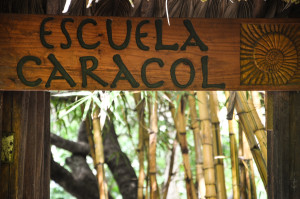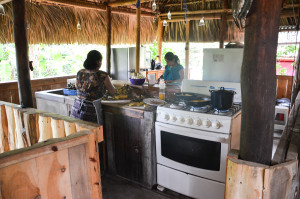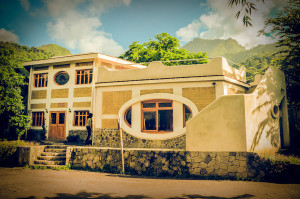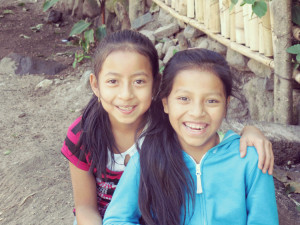Elyse Pomeranz, mentor of the Rudolf Steiner Centre Toronto, visit Escuela Caracol
Elyse Pomeranz is teacher Karin’s mentor. As a part of her mentoring, she visited us and we spent an amazing time together. This is a beautiful letter she wrote, originally published in the Rudolf Steiner Centre’s Newsletter:
♥
 I made my way along a path. On one side I heard the sound of rushing water, on the other side I saw trees and bushes much of it new and unfamiliar and in ecstatic bloom. Under my feet is a path of earth and rocks. I arrive at a wooden door and stand at the threshold of Escuela Caracol. I push the heavy door open and what I see takes my breath away.
I made my way along a path. On one side I heard the sound of rushing water, on the other side I saw trees and bushes much of it new and unfamiliar and in ecstatic bloom. Under my feet is a path of earth and rocks. I arrive at a wooden door and stand at the threshold of Escuela Caracol. I push the heavy door open and what I see takes my breath away.
The trees, bushes and flowering plants are abundant and healthy. They are clearly tended with great care and attention. There is a cobble path that winds and curves gently among the buildings. The buildings themselves sit comfortably amongst all that is living and growing. In fact they seem as if they “grew” there as vital and alive as the plant life. There are butterflies of different sizes and colours playing joyfully, freely flying in the “inner” spaces of the open walled meeting room, kitchen, community gathering space and open classrooms. There are other classrooms added recently which are enclosed . These new buildings are simple and beautiful. They were carefully imagined and work harmoniously with the rest of the campus.
 I notice the kitchen. There are two women moving easily around the counters, sinks and wood burning stove. The roof, supported by wooden posts, provides a space without walls, open to the beauty of the abundant gardens and the sounds of the children having lessons or playing. It was quickly clear to me that this wonderful open kitchen is the heart of the school. The cooks, some of the longest standing members of this community are preparing fresh , healthy and delicious snacks and lunches for ALL THE MEMBERS of the community; children, teachers and staff are all fed.
I notice the kitchen. There are two women moving easily around the counters, sinks and wood burning stove. The roof, supported by wooden posts, provides a space without walls, open to the beauty of the abundant gardens and the sounds of the children having lessons or playing. It was quickly clear to me that this wonderful open kitchen is the heart of the school. The cooks, some of the longest standing members of this community are preparing fresh , healthy and delicious snacks and lunches for ALL THE MEMBERS of the community; children, teachers and staff are all fed.
Sitting in the Grade Four/Five classroom at snacktime and lunchtime I am touched by the enthusiasm of the students for their food, for sharing the meal and also conversation that ranges in topic from school related questions to speaking about their diverse lives at home. This is a relaxed and respectful space.
I was also aware of what was NOT in the room…the stress of the parents and teachers to prepare and pack food that would travel well and be edible even if it returned home after 10 hours uneaten. The stress of refereeing the culture of lunch swapping between children where some parents would be upset if their child ate something forbidden. The stress of communicating with parents and enforcing the school policy around sweets and candy etc. The wastefulness of garbage and packaging that is involved in sending the food with the children in lunch bags.
 So much is freed up and so much rich social fabric built up with this important central activity. It is a great challenge for the school to continue to support this program as it is costly. I heard how the cooks travel to special weekend markets to get the ingredients they need for the week. I am so heartened by their efforts to ensure this continues! I am sure that help for the program would be welcome.
So much is freed up and so much rich social fabric built up with this important central activity. It is a great challenge for the school to continue to support this program as it is costly. I heard how the cooks travel to special weekend markets to get the ingredients they need for the week. I am so heartened by their efforts to ensure this continues! I am sure that help for the program would be welcome.
Examining the food program offers a way into understanding what is so beautiful and nourishing about this school. There is a grounding, a healthy respect for basic needs and for care of the body and sense experiences that makes it possible to work with other very challenging aspects in the cultural and intellectual realm.
The students come from a diverse set of circumstances at home. Culturally and also socio-economically there is a wide variety in the classes. They join together and share the world of story, painting, sculpting, handwork, singing, recorder, guitar, drawing, writing, reading, games and drama. This is Waldorf education at its best.
 The teacher of grade five told me that at the end of a block on Ancient Egypt the children crowded around a map of the pyramids that showed the location of the Sphinx. Behind their teacher the blackboards were full of beautiful chalk images from the stories. The children were all discovering that these places they heard about are real, they exist in the world to be seen/heard….after a pause for a moment one student declared…”Does that mean that the gods are real too?!”
The teacher of grade five told me that at the end of a block on Ancient Egypt the children crowded around a map of the pyramids that showed the location of the Sphinx. Behind their teacher the blackboards were full of beautiful chalk images from the stories. The children were all discovering that these places they heard about are real, they exist in the world to be seen/heard….after a pause for a moment one student declared…”Does that mean that the gods are real too?!”
There is certainly an aspect of contemporary culture that permeates this remote village on the Lake Atitlan. There are cell phones in teachers pockets and the children hear western music blasted over loud speakers at a village wide end of year school festival (not an event that was organized by the Escuela Caracol but they were in attendance, a way to stay connected to the village community) and yet there is an openness and amazement and receptivity to nature, to story and to the artistic experiences that seems to be a special gift in these classrooms. The teachers are devoted, enthusiastic, clear and strong individuals who live and walk their talk.
My brief visit to Escuela Caracol has opened my mind and heart. I am inspired and grateful!
[author] [author_image timthumb=’on’]https://escuelacaracol.org/wp-content/uploads/2015/04/20150402075852-Elyse.jpg[/author_image] [author_info]My name is Elyse Sara Hadassah Pomeranz. I was born October 23 1961 in Montreal, Canada. I have worked as a Waldorf Class teacher with two groups in two different schools in the Toronto area. I have visited over 40 Waldorf Schools in North America and Europe. I currently am a mentor of teachers including working in the Part Time Waldorf Teacher Certification as part of the Rudolf Steiner Centre in Richmond Hill. I have been fortunate to work with two schools whose student body is indigenous Canadian mohawk children and indigenous Mayan children (in Guatemala). I also teach blocks (that typically run for one month) for all grades from 1-8. I work with teachers within the Waldorf system and also teachers who work in other systems. I have been involved in Waldorf education since 1994.[/author_info] [/author]
